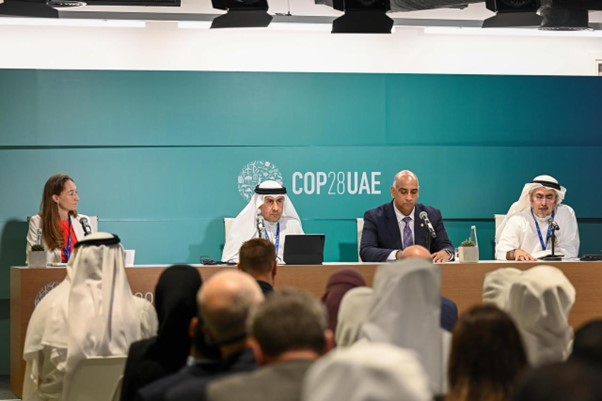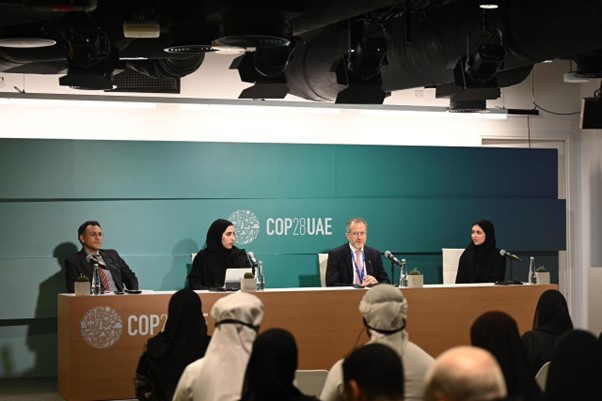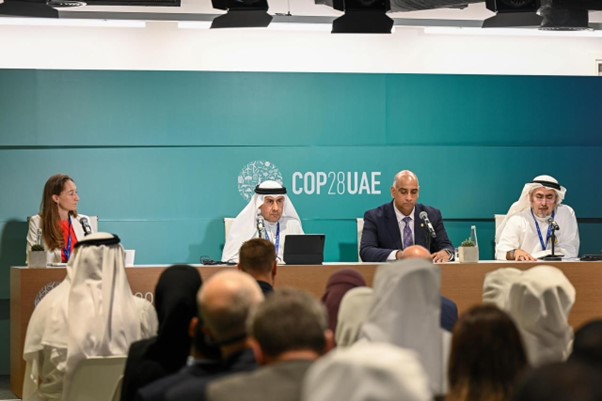In line with its participation in COP28 and to enhance its engagement in the most important global event in the field of climate action, TRENDS Research and Advisory, in partnership with the Atlantic Council, organized the third annual conference titled “Sustainable Security: The Soft and Hard Implications of Climate Action” on 4-5 December 2023, at Expo City, Dubai.
The conference was attended by several officials along with approximately 20 political, academic, and environmental experts from various countries around the world. Among the notable participants were Anne Witkowsky, Assistant Secretary for the Bureau of Conflict and Stabilization Operations for the United States Department of State, William Wechsler, Senior Director, Rafik Hariri Center and Middle East Programs, Atlantic Council, and Serge Stroobants, Director of the Europe and MENA region Institute for Economics and Peace.
The participants discussed political and strategic issues facing international climate action, the impact of climate change on the nature of security and political conflicts, the green economy and the future of climate finance, energy transition, and net-zero emissions.
After two days of discussions and contributions, the conference recommended the development of credible predictive systems to identify geographies most at risk from climate impacts and prioritize countries in need of assistance based on their risk profiles. Additionally, it called for the formal inclusion of climate change in transboundary water agreements, with a focus on investing in infrastructure capable of withstanding rising sea levels and other climate-related risks in coastal areas. Participants also urged for innovation in advanced monitoring systems, early warning technologies, and sustainable military practices to enhance security capabilities and build resilience at both national and international levels.
The recommendations further emphasized the need to create new financial tools to mobilize and direct private financing towards urgent climate innovations and research, supporting a comprehensive energy transition. They also highlighted the necessity of implementing multi-stakeholder efforts to facilitate trade in clean energy supply chains and taking joint measures to promote research, development, and recycling at the end of their lifespan.
Furthermore, conference participants emphasized the importance of establishing mechanisms for climate finance at the national level, enabling governments to align general funding objectives with climate finance. They stressed the importance of maintaining the momentum of achievements made at COP28 by integrating climate objectives into national policies and allocating financial resources accordingly. They called for an acceleration of diplomatic efforts to address regional climate challenges cooperatively and to enhance dialogue and joint initiatives. They also stressed the need to bridge the climate finance gap, with a focus on mobilizing and directing private finance to support comprehensive energy transformation. The participants anticipated that green investments and flexible international supply chains would be crucial factors in developing a new climate economy.
In particular, the participants recommended updating and upgrading the missions of each branch of the service in favor of green innovation, emission reduction, and increased focus on responding to climate-related disasters. They called for increasing and encouraging partnerships between military institutions and other entities, including other governments, the private sector, and local communities, to enhance energy transformation.
The conclusion drawn by the conference participants was that addressing the complex climate crisis requires adopting a qualitative shift and an approach that encompasses the entire society, not just relying on governments alone. This approach should be multi-faceted and graduated, from the top to the bottom and vice versa.
News link:
Video








